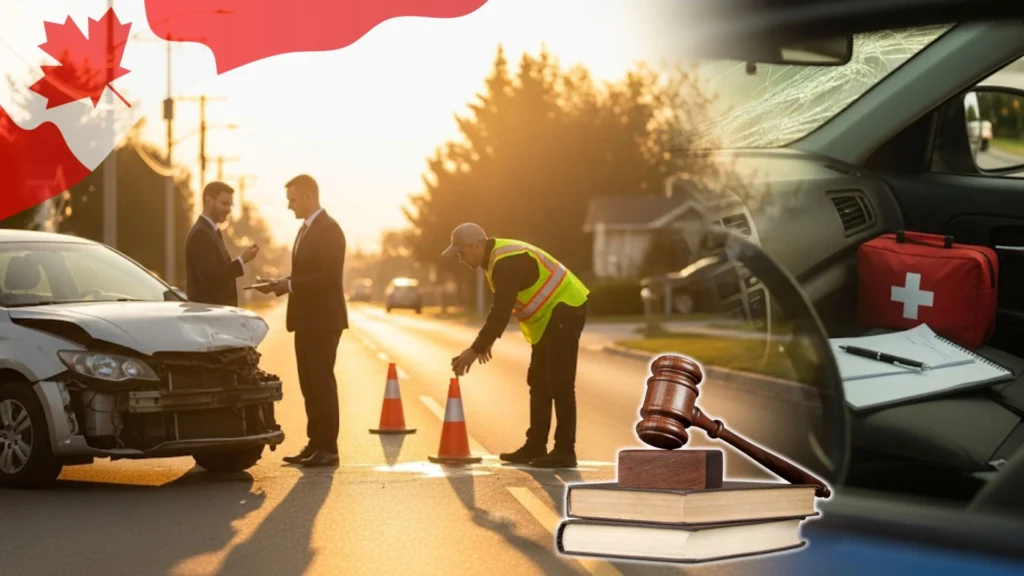Getting into a car accident can be one of the most stressful and disorienting experiences. Whether it’s a minor fender bender or a major collision, knowing what legal steps to take immediately after the incident is crucial—not just for your safety, but also for protecting your rights and ensuring you receive proper compensation if needed.
In this guide, we’ll walk you through the essential legal steps to take after a car accident in Canada, including what to do right away, your legal obligations by province, when to contact a car accident lawyer, how to deal with insurance companies, and what evidence you need to support a potential claim.
What to Do Immediately After a Car Accident
Your actions in the minutes and hours following a car accident can significantly affect your health, safety, and any future legal claims. Here’s what to do:
1. Ensure Safety
- Move vehicles to a safe location if possible.
- Turn on hazard lights.
- If injuries are involved, stay put and wait for emergency services.
2. Call Emergency Services
- Dial 911 or your local emergency number.
- Request police, ambulance, and fire department assistance as needed.
3. Check for Injuries
- Check yourself and others for injuries.
- Administer first aid if trained and necessary.
- Wait for medical professionals before moving injured individuals.
4. Exchange Information with Other Drivers
Collect:
- Full names
- Contact details (phone, email, address)
- Insurance company name and policy number
- Vehicle make, model, and license plate number
5. Document the Scene
- Take photos of all vehicles involved, damage, skid marks, traffic signs, and road conditions.
- Note the time, date, weather, and lighting conditions.
- Record witness names and contact info if available.
6. File a Police Report
- Mandatory in most provinces if there are injuries, significant damage, or disputes.
- Obtain a copy of the police report for your records.
Legal Obligations by Province
Each province in Canada has its own set of rules regarding reporting accidents, insurance requirements, and deadlines for filing claims. Here’s a quick comparison:
| Province | Must Report to Police? | Deadline to File Claim | Fault-Based or No-Fault System |
|---|---|---|---|
| Ontario | Yes, if injury/death or over $2000 damage | Typically 2 years from accident date | No-fault (PIP) |
| British Columbia (BC) | Yes, if injury/death or over $1000 damage | Typically 2 years from discovery of injury | No-fault (ICBC system) |
| Alberta | Yes, if injury/death or over $2000 damage | Generally 2 years from accident date | No-fault (minor injuries covered by insurance) |
| Quebec | Yes, if injury/death or over $5000 damage | 3 years from accident date | Private insurance; fault-based for serious injuries |
| Nova Scotia | Yes, if injury/death or over $2000 damage | 2 years from accident date | No-fault system |
Always check your specific provincial regulations, as fines or penalties may apply for not fulfilling legal duties post-accident.
When to Contact a Car Accident Lawyer
While many car accidents are handled directly through insurance, some situations require legal representation:
You Should Consider Hiring a Lawyer If:
- There are serious injuries or fatalities
- The other party denies responsibility
- Your insurance company refuses to pay a fair settlement
- You’re being sued by another driver
- You’re unsure about your rights or next steps
A skilled car accident lawyer can help negotiate settlements, gather evidence, represent you in court, and ensure you receive maximum compensation for medical bills, lost wages, pain, and suffering.
How to Deal with Insurance Companies
Insurance adjusters may seem helpful, but remember: their goal is to minimize payouts. Here’s how to protect yourself:
Tips for Dealing with Insurers:
- Don’t admit fault—even saying “I’m sorry” can be interpreted as an admission.
- Avoid giving recorded statements unless advised by a lawyer.
- Keep detailed records of all correspondence, expenses, and treatments.
- Don’t settle too quickly—you might miss out on compensation for long-term effects.
- Review offers carefully—consult a lawyer before signing anything.
If negotiations stall or you feel pressured, it may be time to involve a personal injury lawyer.
What Evidence You Need for a Legal Claim
To build a strong case, you’ll need solid documentation. Here are the key pieces of evidence:
Essential Evidence for a Car Accident Claim:
- Police report
- Photographs of the scene and vehicle damage
- Witness statements
- Medical reports and treatment records
- Receipts for repairs, prescriptions, and travel expenses
- Proof of income loss (pay stubs, employer letters)
- Personal journal documenting pain, recovery, and emotional impact
The more thorough your documentation, the better your chances of receiving fair compensation.
Tips from Real Canadian Lawyers
We reached out to experienced car accident lawyers across Canada to get their top advice:
“Never rush into a settlement. Many injuries don’t show symptoms until weeks later.”
— Toronto Personal Injury Lawyer“Even in no-fault systems, proving liability can still matter for pain and suffering claims.”
— Vancouver Car Accident Attorney“Don’t underestimate psychological trauma. Mental health impacts are valid and compensable.”
— Montreal Injury Law Specialist“Hiring a lawyer early can prevent mistakes that weaken your case.”
— Calgary Accident Lawyer
Final Thoughts
Being involved in a car accident can be overwhelming, but taking the right legal steps immediately afterward can make a world of difference. From calling the police and collecting evidence to understanding your insurance rights and seeking legal help when needed, each action plays a role in protecting your interests.
Remember: You have rights under Canadian law. Don’t let confusion or pressure from insurance companies lead to unfair outcomes. If you’re unsure about your next move, consult with a qualified car accident lawyer to guide you through the process.
